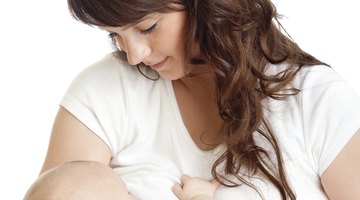Sweating While Breastfeeding
Even if you don't choose to breastfeed your baby, postpartum sweating is a common and normal reaction your body has in the weeks following childbirth.
The close proximity of your baby and increased body temperature of breastfeeding may exacerbate the problem.
In fact, breastfeeding often causes your baby to sweat as well. By understanding the causes for the excess sweat, you can work to prevent the unpleasant occurrence until your body temperature and fluid levels regulate following labor and delivery.
Postpartum Sweating
When you're pregnant, especially in the last few months of pregnancy, your body retains more water than normal. The hormonal changes in your body cause water retention. As those hormones become regulated after labor and delivery, sweat is one of the ways your body expels the excess water. You'll likely also need to urinate more frequently than usual. Postpartum sweating is a common but completely normal reaction to the changes to your body after pregnancy, but certain things, such as hot weather, holding your warm baby or wearing clingy clothing, make the condition worse.
Baby Sweating

How to Get Rid of Hiccups in a Newborn
Learn More
Your baby sometimes sweats during breastfeeding as well. Your baby's sweating typically occurs for a different reason than yours, which is hormone driven.
Instead, your baby likely sweats because he's warm while breastfeeding. Being skin to skin with your baby raises his body temperature, which initiates his natural cooling system.
Coping
While postpartum sweat is often unpreventable, breastfeeding often exacerbates the problem since you're already warm.
To combat the uncomfortable and sometimes embarrassing effects of excess sweat, nurse in cool, well-ventilated areas whenever possible.
Wear loose-fitting clothes made from natural fiber to allow better airflow.
If you're comfortable with the idea, try and breastfeed without a cover or blanket to keep you and your baby cool. Continue drinking water to stay well hydrated and flush your body of retained water.
Potential Problems

Is it Normal to Get Light-Headed When Four Weeks Pregnant?
Learn More
Postpartum sweating is common and normal, but in rare cases, it can signal a medical problem. While sweating typically lasts longer in women who are breastfeeding, your body should be back to normal by your six-week postpartum checkup. If you continue to sweat or your sweat is accompanied by a fever, you could be sick. See your doctor if your sweating doesn't subside or becomes excessive. Excess sweat is also sometimes the sign of a thyroid issue, so mention the condition during your postpartum checkup appointment to ensure that your body is healthy after pregnancy.
Related Articles
- "The Mother of All Baby Books: An All-Canadian Guide to Your Baby's First Year"; Ann Douglas; 2002
- Babycenter.com: Postpartum Sweating
- What to Expect: Sweating Postpartum











